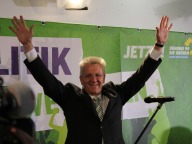Germany's Green party is celebrating after voters in the state of Baden-Württemberg turned their backs on Angela Merkel's Christian Democratic Union (CDU) party in local elections held days after Merkel announced shutdowns of the country's oldest nuclear power plants.
The CDU won the largest share of the vote, at 39.0%, but this was not sufficient for it to form a government with its
 |
| Baden-Württemberg Greens chairman Winfried Kretschmann celebrates victory (Image: Die Grünen) |
The vote is being seen as a barometer of German sentiment since Chancellor Angela Merkel's 15 March announcement of a three-month moratorium on nuclear power and the immediate closure of the country's oldest nuclear plants in the wake of the recent incidents at Japan's Fukushima Daiichi. The CDU had dominated the state government, leading either in its own right or in coalition, since 1953, and Baden-Württemberg itself is home to four operating nuclear power plants, two of which - Phillipsburg 1 and Neckarwestheim 1 - have been closed under the latest decree. The state itself agreed in late 2010 to buy out EdF's share of local nuclear generator EnBW.
The German government's decision to close the plants was taken only months after it effectively cancelled an earlier nuclear phaseout policy by allowing the country's nuclear power plants to continue operating beyond arbitrarily set closure dates. Some have suggested that the nuclear turn-around is politically motivated. According to SpiegelOnline, voters in Baden-Württemberg "apparently saw [Merkel's] sudden decision to temporarily take a number of older reactors off the grid as blatant electioneering". The incumbent CDU state governor, Stefan Mappus, had been noted as a supporter of nuclear power.
Germany's next round of federal elections is not due to take place until 2013.
Researched and written
by World Nuclear News






_15863.jpg)







